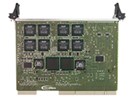ADSP-21160 cPCI DSP Board

The board's architecture combines ADSP-21160 processing power with a 64-bit 66 MHz PCI interface, expansive memory options, a variety of I/O interfaces, and the company's SharcFIN ASIC technology. The board features two clusters of four ADSP-21160 SHARC DSPs, each providing 600 MFLOPs of processing power for a total of 4800 MFLOPs. It also supports up to 3,184 MB/s of external I/O bandwidth, which is available via sixteen external link ports, two 64-bit 66 MHz PMC+ interfaces, and a 64-bit 66 MHz cPCI interface.
Other I/O interfaces on the board include two RS-232 ports, a JTAG emulation interface, and two TDM serial ports. For memory options, the board incorporates up to three 64-512 MB banks of SDRAM (one per cluster and one shared) and two 2 MB banks of Flash memory.
Providing the backbone of the board's architecture are two SharcFIN ASICs. The SharcFIN ASICs provide a comprehensive set of bus interfaces and peripherals for the ADSP-21160 DSPs and simplify board-level implementation. They integrate a full-featured SDRAM controller, a full 64-bit 66 MHz master PCI interface, a peripheral bus that interfaces the DSPs to peripherals such as the RS-232 UARTs and Flash, and an extensive flag and interrupt multiplexer.
A complete set of software development tools is available to support the board. The DSP21k Toolkit allows users to develop application code and integrate the board into their systems. The board is fully compatible with Analog Devices' VisualDSP and supports in-circuit emulation. It is also compatible with SpeedDSP, highly-optimized, C-callable runtime libraries, and with SharcLAB, BittWare's interface to MATLAB Simulink and Real-Time Workshop.
<%=company%>, 33 N. Main St., Concord, NH 03301. Tel: (603) 226-0404.
